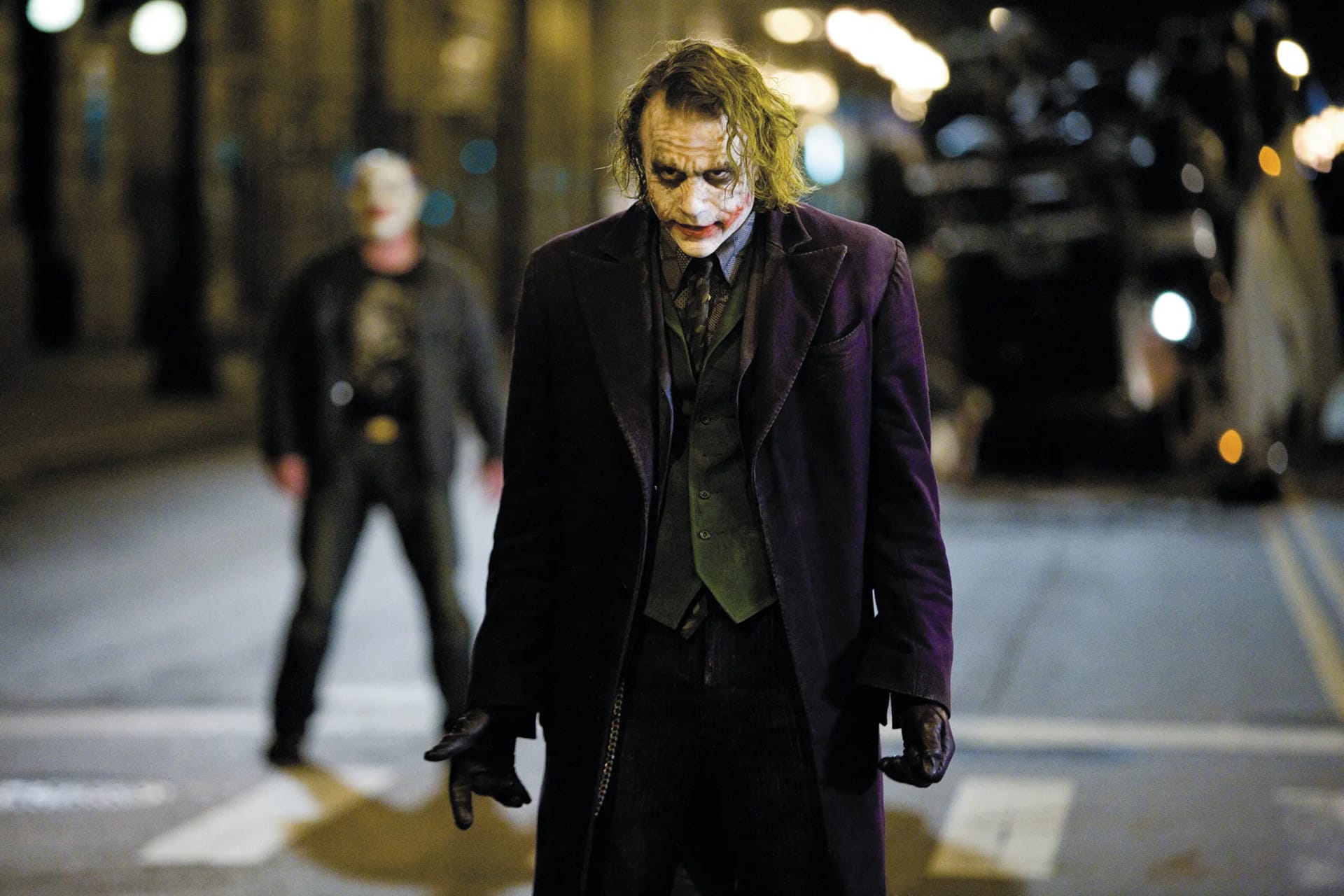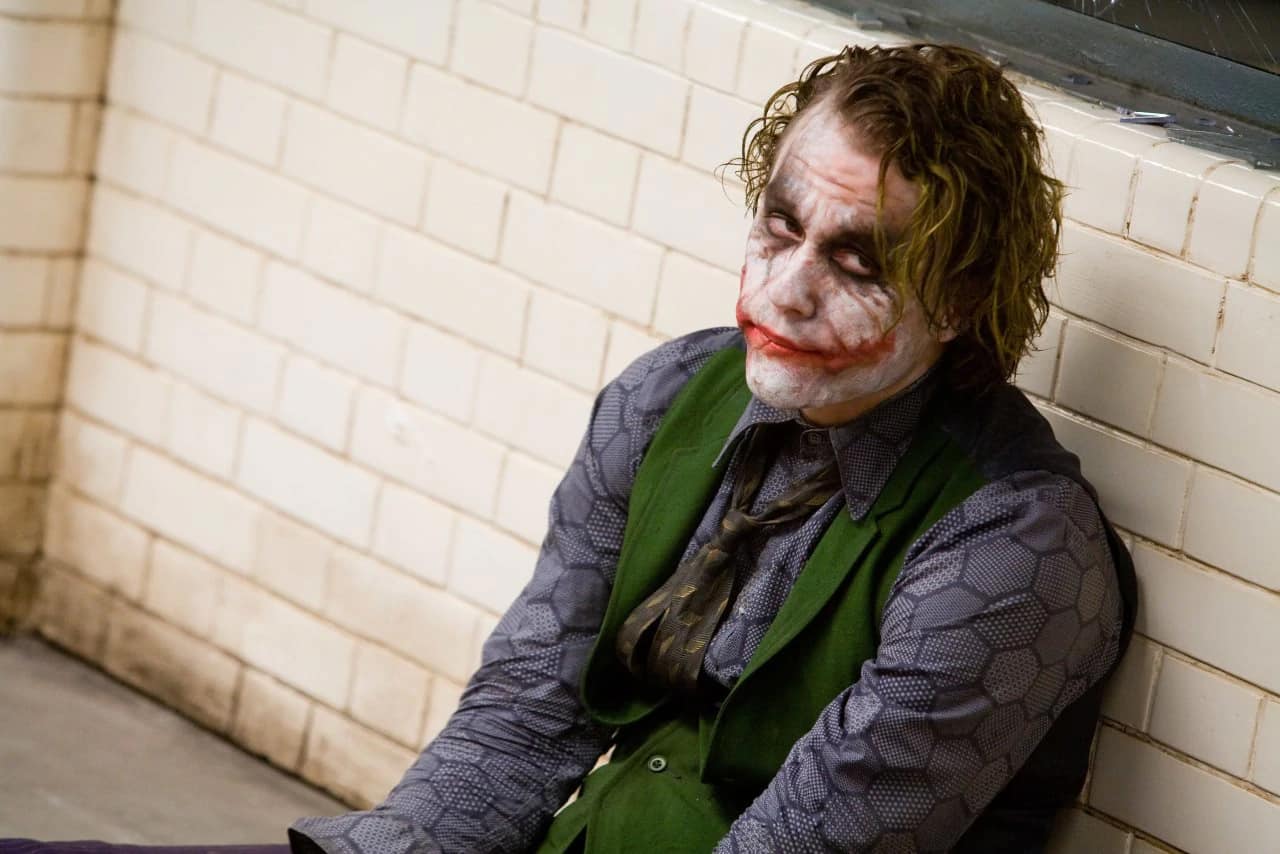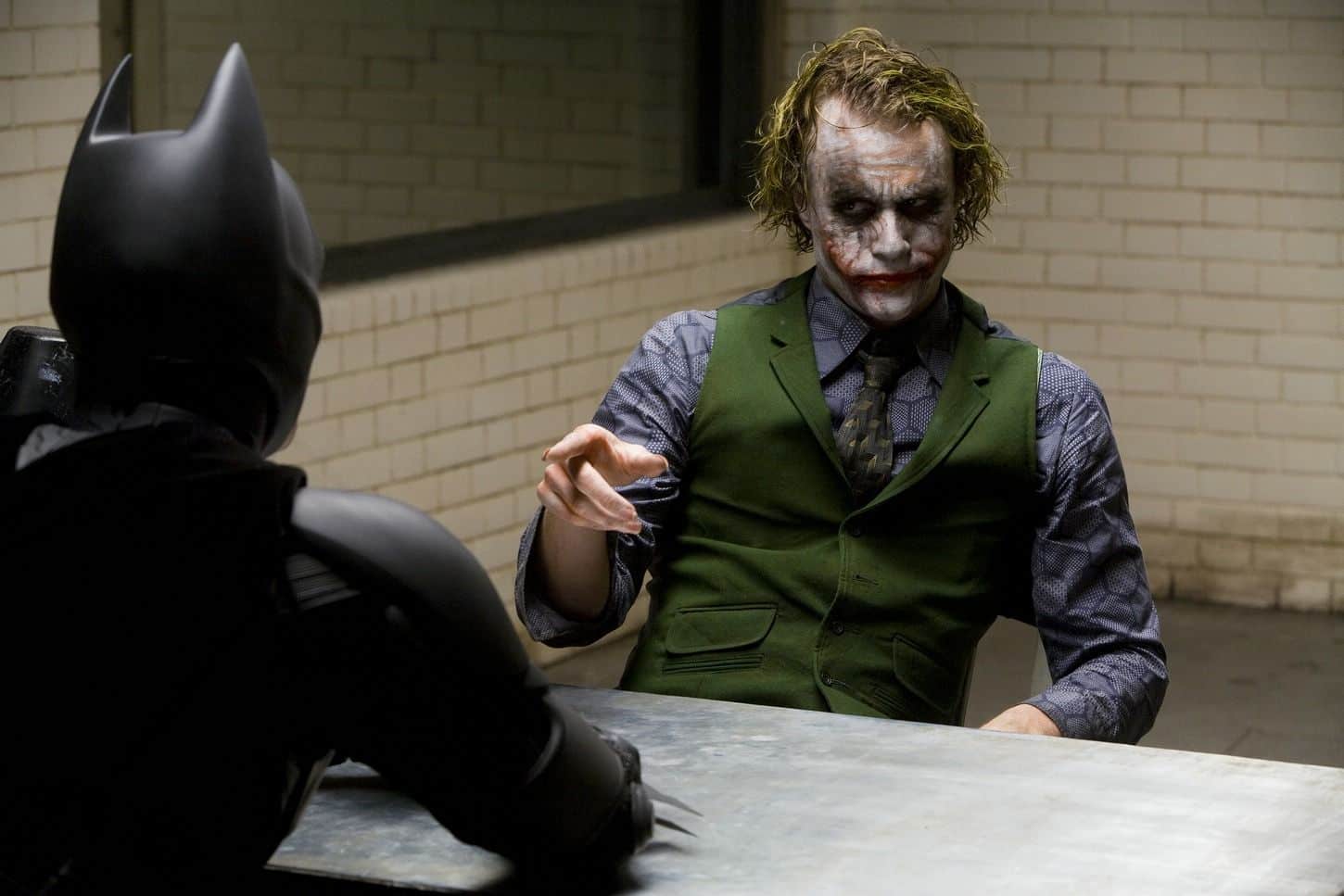The Joker Hijacked the Narrative of The Dark Knight
This week's In the Entrap video deals more directly with the mechanics of how the Turkey distorts Christopher Nolan's The Dark Knight. The below article explores the idea from a many line linear perspective. Equal sure to enjoy both!
The Dark Horse is single in Nolan's filmography because it is a (mostly) linear pic.
As many critics have celebrated, Nolan's films tend to distort chronology. Memento features deuce plots, one tossing forward in time and combined hurling backwards. Insomnia features frequent cuts to an event that occurred earlier the movie's chief story kicks off. The Prestige jumps between two competing accounts of a shared history. Batman Begins drifts into and forbidden of memory as it offers an origin for the Caped Reformer. Even Dunkirk has three different timelines that only overlap at the sexual climax.
There is an obvious reason for this. Most of Nolan's films are anchored in the subjective experiences of their protagonists. The strange chronology of Memento allows audiences to feel for for each one scene like Leonard Shelby (Guy Pearce), with no memory of what came before. The narrative of Batman Begins ebbs and flows with memories of Bruce Mad Anthony Wayne (Christian Basel). Dunkirk focuses on the subjective experience of the passage of clock time of the characters moving through it.

Outside of a copulate of montages that depict asynchronous events and a very quick flashback shot of Rachel Dawes (Maggie Gyllenhaal), the bulk of The Benighted Knight unfolds in a very straightforward personal manner. Events occur in sequence, and the plot moves organically from one plot point to the adjacent. Nolan still structures the plastic film so that he dismiss cross-cut 'tween five-fold locations and story threads at key moments, but the narrative is as straightforward as any Nolan has constructed.
This prime serves an important thematic function. The fixed linear structure of The Dark Horse exists in double-dyed opposition to the presence of the Joker (Heath Ledger). It has become a cliché to describe the Clown Prince of Crime as an "federal agent of chaos," but he genuinely represents that within the narrative framework of The Dark Knight. The Joker International Relations and Security Network't just a threat to the ordered world of Gotham, only also a challenge to the bodily structure of the flic around him.
In many another shipway, the Joker is a typical Nolan frien. Most of Nolan's protagonists are obsessives WHO seek to impose their own tell connected a chaotic reality. In Memento, Dutch Leonard builds himself an unsolvable mystery to assuage his own guilt feelings over his responsibility for the death of his married woman (Jorja Flim-flam). In Batman Begins, Bruce builds Batman to escape his have see red and guilt over the Death of his parents. Characters set up rules to govern their behavior and to order the world.
The tension in a Christopher Nolan moving picture often results from when his admirer's worldview comes into conflict with immutable world and when the systems and rules that these men have shapely to protect themselves break down. In Origination, Dom Cobb (Leonardo DiCaprio) spends most of the movie lying to himself and to his team in order to maintain the thaumaturgy of control. Arthur (Joseph Gordon-Levitt) wryly remarks on "how a good deal fourth dimension Cobb spends doing things he says ne'er to do."

The fractured structure of these films reflects the subjective go through of their protagonists, inviting the audience to live the film from the perspective of these leading characters. Nolan explains his approach through with the metaphor of a maze, "You don't want to be hanging down above the tangle watching the characters pee the wrong choices because it's frustrative. You actually deprivation to be in the maze with them, devising the turns at their side, that keeps it many heady."
In The Dark Dub, the Joker is so terrifying because the audience is looking at a Nolan protagonist from the outside. For all that the Joker might utter about how he wants to prove that Batman lives in "a world without rules," the Joker actually wants to impose his rules upon the world. The Joker's complex plans are nil but sets of rules. When he takes Rachel and Harvey (Aaron Eckhart) hostage, helium goads Batman, "You'll have to play my game if you wanna save unmatched of them."
The Turkey stiff entirely alien over the course of The Dispiriting Knight. Borrowing a whoremaster from Alan Moore and Brian Bolland's The Killing Joke, the film declines to return the character a clear origin. However, his ultimate object lens is to validate his belief that people are "only as good as the world allows them to be." Totally of his tricks and gambits are set up to formalise that arguin, flat if — like Leonard or Cobb — he frequently breaks his own rules to prove his point.
This is the substance of the conflict between Batman and the Joker. In Batman Begins, Sir David Bruce constructed Batman as "a symbol" that could be "indestructible" and "everlasting," a representation of what Gotham could be that might utter to citizens and "shake them out of apathy." Bruce constructs Batman As a tale. In The Dark Knight, the Joker is expressly positioned as a rejoinder-story. As such, he seems to wage a guerrilla war against the movie itself.

The Joker exerts such a intense pull that he bends the picture show or so him. The iconic basic shot, in which the lineament pulls off his mask to announce himself to the camera, is slimly impossible of focus — as if the fictional character is torture against the celluloid. The character seems to push against Nolan's authority in other slipway; Heathland Ledger reportedly directed the case's video messages himself. Nolan's photographic camera figure out becomes notably more mercurial and jerky when focused on the Joker.
At the end of the film, Bruce has fought the Joker to a standstill. The two ferries refused to be adrift themselves up. However, the Jokester has "an ace in the fix." He has corrupted Harvey Dent. Bruce wish have to cover up Harvey's crimes to preserve the legend of Gotham's questionable "White Knight." Of this stalemate between the Joker and Batman, the Joker laughs, "This is what happens when an unstoppable impel meets an immovable aim."
Still, there is a sentience in which The Darkened Knight bends towards the Joker. In his inalterable shot, as the Joker hangs upside down, the camera begins to rotate. It's a classic Nolan shot, one employed in films like Origin, Interstellar, and Dunkirk. The camera is spinning to face up the Joker happening his ain terms. The human beings is upper side down, but the Joker looks into the camera head along. Notably, it emulates an early shot from the Joker's own video of newscaster Microphone Engel (Susan Brownell Anthony Michael Dormitory).

"Madness, as you know, is alike gravity," the Joker tells Batman. The film literalizes this, the camera moving as if caught in the villain's area and pull. IT's also an interesting change state of phrase, A Nolan's films repeatedly return to the idea of gravity A a universal constant. A more more humanist cinema, Interstellar argues that love is a ecumenical force equivalent to gravity. So, Abigail Brand (Anne Hathaway) explains that "the only thing that buttocks move across dimensions, equal time, is sombreness."
In Interstellar, Brand creates an equivalence between gravity and love as forces that are strong enough to overstep "the dimensions of time and blank space." Given how important fourth dimension is to Nolan as a filmmaker, that is an dramatic claim to make. In The Dark Knight, the Joker appears to make the selfsame argument for his ain madness. The way that the film seems to buckle low the character's influence suggests that there is some the true in the statement.
Heath Ledger deserves all the credit that helium has earned for his performance. Notwithstandin, one of the reasons that the Joker works as well as he does is because the linear structure of the film is designed to oppose the character so aggressively. The Dark Knight must be structured unconventionally for a Saint Christopher Nolan film, if exclusive and so that the Joker can hijack control of the narrative and really "introduce a dinky lawlessness" into the motion picture's otherwise tight construction.
https://www.escapistmagazine.com/the-joker-hijacked-the-narrative-of-the-dark-knight/
Source: https://www.escapistmagazine.com/the-joker-hijacked-the-narrative-of-the-dark-knight/